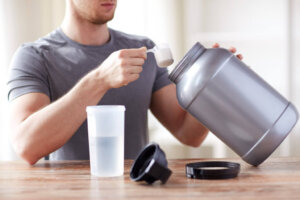9 Myths About Creatine

Creatine is one of the most popular supplements among athletes and people who exercise regularly. It’s used to improve general performance in training. Despite its widespread use, many myths about creatine persist today. We review some of them from the experts.
Main myths about creatine
It isn’t possible to list all the myths about creatine in this article, and so we’ve focused on the most important ones, in principle, on those with greater social acceptance. Of course, we’ll expose each of them as myths based on recent scientific evidence.
1. It’s similar to anabolic steroids
False. The chemical structure of anabolic steroids is completely different from that of creatine, as well as its mechanism of action. As experts point out, anabolic-androgenic steroids (AAS) are synthetic analogues of testosterone. Apart from many other aspects, AAS increase muscle mass and strength as a consequence of increased muscle protein synthesis.
For its part, creatine, or methylguanidine-acetic acid, is an endogenous nitrogenous organic acid that’s produced through reactions involving the amino acids arginine, glycine, and methionine in the kidneys and liver. This is converted to phosphocreatine (PCr), mediated by the enzyme creatine kinase (CK) in muscle, and regulates the production of intracellular adenosine triphosphate (ATP).
The increase in ATP production during training is what drives the benefits in performance, power, strength, and recovery. Although the result may be similar, the mechanism of action isn’t.
There is also the legal factor to consider: in most countries, it’s illegal to possess and administer anabolic steroids (at least without a prescription). This does not apply to the use, possession and administration of creatine.
2. You can gain muscle without training
False. The benefits of taking creatine supplements are only achieved when accompanied by regular exercise. The evidence indicates that the improvement in physical performance, fat-free mass, and muscle morphology are only achieved when combined with an intense exercise routine. The results are much less consistent in training with moderate intensity.
3. It’s only useful for muscular endurance and power

False. Although it’s true that creatine intake has traditionally been associated with activities, exercises, or sports related to endurance and power, today we know that it has parallel benefits. For example, it promotes the accumulation of muscle glycogen (especially when combined with protein and carbohydrates).
In this sense, creatine can help athletes who demand large amounts of glycogen during training to maintain optimal levels throughout it. As a consequence, muscle recovery is promoted and overtraining is avoided.
Studies and research in this regard support this association. It’s one of the most believed myths about creatine among those who use the supplement.
4. It produces fluid retention
Half true. The first studies in relation to the intake of creatine associated the supplements with fluid retention. Evidence suggests that fluid retention does occur both intracellularly and extracellularly.
However, this effect is transitory and only lasts for the first few days after starting the intake. The supplements do not lead to long-term fluid retention; that is, the regular use that is given to them by athletes.
5. Causes kidney damage or kidney dysfunction
False. Another widely accepted creatine myth is that, because the kidneys are forced to excrete higher than normal levels of creatine, some degree of renal overload occurs. This, they say, will lead to kidney damage or kidney dysfunction. Although it’s difficult to determine the origin of this myth, it is likely due to the publication of a case study in 1998 in the Lancet.
Even though studies had previously been published denying kidney damage associated with creatine intake, and that same year metabolism experts and researchers sent letters to the editor pointing out errors in the cited study, the myth has prevailed ever since. Recent meta-analyses disprove kidney damage and kidney dysfunction associated with creatine intake.
6. It causes hair loss

False. The creatine myth that supplements cause hair loss arose from a study published in the Clinical Journal of Sport Medicine in 2009. Experts looked at the effects of creatine supplementation on serum dihydrotestosterone (DHT) concentrations in college rugby players.
DHT has been linked to some episodes of hair loss and baldness. The results of the study reported a significant increase in DHT levels, although the results have not since been replicated in independent work. At the date of this article, we can confirm that this statement is still considered to be one of the myths about creatine.
7. It produces dehydration and muscle cramps
False. In the mid-2000s, a report from the American College of Sports Medicine (ACSM) recommended that high-intensity athletes who train in hot environments avoid creatine intake. The rationale, by then, was that the supplements were believed to alter the distribution of fluids throughout the body, which increased the risk of dehydration and muscle cramps.
Despite this, it is known that its intake does not increase the risk of developing cramps and, as we have seen, the distribution of fluids is only a temporary and transitory effect. Due to the latter, it’s highly unlikely that a person will develop dehydration as a consequence of taking creatine supplements.
8. It increases fat mass
False. Since athletes experience weight gain due to fluid retention during the first few days, the myth has been created that creatine increases fat mass. Although it’s true that most studies are based on an analysis of intake of no more than 8 weeks, there’s no evidence that supplements increase body fat mass.
9. It’s beneficial for the elderly
Half true. As we have already established, creatine intake has no effect if it isn’t accompanied by regular exercise. As specialists warn, supplements of this type don’t have an effect on lean mass, muscle function, or bone function in older people. At least, not when prescribed in the absence of a physical activity program.
On the contrary, there’s evidence of positive effects when accompanied by regular exercise in terms of bone health. There are also studies that support its effectiveness in gaining muscle mass in older adults. The latter could be beneficial in coping with sarcopenia. In any case, by itself creatine has no effect.
Myths about creatine have a great social diffusion. Using a supplement involves learning about its benefits and adverse effects, as well as the myths around it. We hope that the information provided has been useful among those who use creatine to improve their athletic performance.
Creatine is one of the most popular supplements among athletes and people who exercise regularly. It’s used to improve general performance in training. Despite its widespread use, many myths about creatine persist today. We review some of them from the experts.
Main myths about creatine
It isn’t possible to list all the myths about creatine in this article, and so we’ve focused on the most important ones, in principle, on those with greater social acceptance. Of course, we’ll expose each of them as myths based on recent scientific evidence.
1. It’s similar to anabolic steroids
False. The chemical structure of anabolic steroids is completely different from that of creatine, as well as its mechanism of action. As experts point out, anabolic-androgenic steroids (AAS) are synthetic analogues of testosterone. Apart from many other aspects, AAS increase muscle mass and strength as a consequence of increased muscle protein synthesis.
For its part, creatine, or methylguanidine-acetic acid, is an endogenous nitrogenous organic acid that’s produced through reactions involving the amino acids arginine, glycine, and methionine in the kidneys and liver. This is converted to phosphocreatine (PCr), mediated by the enzyme creatine kinase (CK) in muscle, and regulates the production of intracellular adenosine triphosphate (ATP).
The increase in ATP production during training is what drives the benefits in performance, power, strength, and recovery. Although the result may be similar, the mechanism of action isn’t.
There is also the legal factor to consider: in most countries, it’s illegal to possess and administer anabolic steroids (at least without a prescription). This does not apply to the use, possession and administration of creatine.
2. You can gain muscle without training
False. The benefits of taking creatine supplements are only achieved when accompanied by regular exercise. The evidence indicates that the improvement in physical performance, fat-free mass, and muscle morphology are only achieved when combined with an intense exercise routine. The results are much less consistent in training with moderate intensity.
3. It’s only useful for muscular endurance and power

False. Although it’s true that creatine intake has traditionally been associated with activities, exercises, or sports related to endurance and power, today we know that it has parallel benefits. For example, it promotes the accumulation of muscle glycogen (especially when combined with protein and carbohydrates).
In this sense, creatine can help athletes who demand large amounts of glycogen during training to maintain optimal levels throughout it. As a consequence, muscle recovery is promoted and overtraining is avoided.
Studies and research in this regard support this association. It’s one of the most believed myths about creatine among those who use the supplement.
4. It produces fluid retention
Half true. The first studies in relation to the intake of creatine associated the supplements with fluid retention. Evidence suggests that fluid retention does occur both intracellularly and extracellularly.
However, this effect is transitory and only lasts for the first few days after starting the intake. The supplements do not lead to long-term fluid retention; that is, the regular use that is given to them by athletes.
5. Causes kidney damage or kidney dysfunction
False. Another widely accepted creatine myth is that, because the kidneys are forced to excrete higher than normal levels of creatine, some degree of renal overload occurs. This, they say, will lead to kidney damage or kidney dysfunction. Although it’s difficult to determine the origin of this myth, it is likely due to the publication of a case study in 1998 in the Lancet.
Even though studies had previously been published denying kidney damage associated with creatine intake, and that same year metabolism experts and researchers sent letters to the editor pointing out errors in the cited study, the myth has prevailed ever since. Recent meta-analyses disprove kidney damage and kidney dysfunction associated with creatine intake.
6. It causes hair loss

False. The creatine myth that supplements cause hair loss arose from a study published in the Clinical Journal of Sport Medicine in 2009. Experts looked at the effects of creatine supplementation on serum dihydrotestosterone (DHT) concentrations in college rugby players.
DHT has been linked to some episodes of hair loss and baldness. The results of the study reported a significant increase in DHT levels, although the results have not since been replicated in independent work. At the date of this article, we can confirm that this statement is still considered to be one of the myths about creatine.
7. It produces dehydration and muscle cramps
False. In the mid-2000s, a report from the American College of Sports Medicine (ACSM) recommended that high-intensity athletes who train in hot environments avoid creatine intake. The rationale, by then, was that the supplements were believed to alter the distribution of fluids throughout the body, which increased the risk of dehydration and muscle cramps.
Despite this, it is known that its intake does not increase the risk of developing cramps and, as we have seen, the distribution of fluids is only a temporary and transitory effect. Due to the latter, it’s highly unlikely that a person will develop dehydration as a consequence of taking creatine supplements.
8. It increases fat mass
False. Since athletes experience weight gain due to fluid retention during the first few days, the myth has been created that creatine increases fat mass. Although it’s true that most studies are based on an analysis of intake of no more than 8 weeks, there’s no evidence that supplements increase body fat mass.
9. It’s beneficial for the elderly
Half true. As we have already established, creatine intake has no effect if it isn’t accompanied by regular exercise. As specialists warn, supplements of this type don’t have an effect on lean mass, muscle function, or bone function in older people. At least, not when prescribed in the absence of a physical activity program.
On the contrary, there’s evidence of positive effects when accompanied by regular exercise in terms of bone health. There are also studies that support its effectiveness in gaining muscle mass in older adults. The latter could be beneficial in coping with sarcopenia. In any case, by itself creatine has no effect.
Myths about creatine have a great social diffusion. Using a supplement involves learning about its benefits and adverse effects, as well as the myths around it. We hope that the information provided has been useful among those who use creatine to improve their athletic performance.
- Antonio J, Ciccone V. The effects of pre versus post workout supplementation of creatine monohydrate on body composition and strength. J Int Soc Sports Nutr. 2013 Aug 6;10:36.
- Cooper R, Naclerio F, Allgrove J, Jimenez A. Creatine supplementation with specific view to exercise/sports performance: an update. J Int Soc Sports Nutr. 2012 Jul 20;9(1):33.
- Chilibeck PD, Candow DG, Landeryou T, Kaviani M, Paus-Jenssen L. Effects of Creatine and Resistance Training on Bone Health in Postmenopausal Women. Med Sci Sports Exerc. 2015 Aug;47(8):1587-95.
- Devries MC, Phillips SM. Creatine supplementation during resistance training in older adults-a meta-analysis. Med Sci Sports Exerc. 2014 Jun;46(6):1194-203.
- de Souza E Silva A, Pertille A, Reis Barbosa CG, Aparecida de Oliveira Silva J, de Jesus DV, Ribeiro AGSV, Baganha RJ, de Oliveira JJ. Effects of Creatine Supplementation on Renal Function: A Systematic Review and Meta-Analysis. J Ren Nutr. 2019 Nov;29(6):480-489.
- Cooke MB, Rybalka E, Williams AD, Cribb PJ, Hayes A. Creatine supplementation enhances muscle force recovery after eccentrically-induced muscle damage in healthy individuals. J Int Soc Sports Nutr. 2009 Jun 2;6:13.
- Greenwood M, Kreider RB, Melton C, Rasmussen C, Lancaster S, Cantler E, Milnor P, Almada A. Creatine supplementation during college football training does not increase the incidence of cramping or injury. Mol Cell Biochem. 2003 Feb;244(1-2):83-8.
- Hall M, Trojian TH. Creatine supplementation. Curr Sports Med Rep. 2013 Jul-Aug;12(4):240-4.
- Kersey RD, Elliot DL, Goldberg L, Kanayama G, Leone JE, Pavlovich M, Pope HG Jr; National Athletic Trainers’ Association. National Athletic Trainers’ Association position statement: anabolic-androgenic steroids. J Athl Train. 2012 Sep-Oct;47(5):567-88.
- Poortmans JR, Auquier H, Renaut V, Durussel A, Saugy M, Brisson GR. Effect of short-term creatine supplementation on renal responses in men. Eur J Appl Physiol Occup Physiol. 1997;76(6):566-7.
- Pritchard NR, Kalra PA. Renal dysfunction accompanying oral creatine supplements. 1998 Apr 25;351(9111):1252-3.
- Sales LP, Pinto AJ, Rodrigues SF, Alvarenga JC, Gonçalves N, Sampaio-Barros MM, Benatti FB, Gualano B, Rodrigues Pereira RM. Creatine Supplementation (3 g/d) and Bone Health in Older Women: A 2-Year, Randomized, Placebo-Controlled Trial. J Gerontol A Biol Sci Med Sci. 2020 Apr 17;75(5):931-938.
- Santos RV, Bassit RA, Caperuto EC, Costa Rosa LF. The effect of creatine supplementation upon inflammatory and muscle soreness markers after a 30km race. Life Sci. 2004 Sep 3;75(16):1917-24.
- Terjung RL, Clarkson P, Eichner ER, Greenhaff PL, Hespel PJ, Israel RG, Kraemer WJ, Meyer RA, Spriet LL, Tarnopolsky MA, Wagenmakers AJ, Williams MH. American College of Sports Medicine roundtable. The physiological and health effects of oral creatine supplementation. Med Sci Sports Exerc. 2000 Mar;32(3):706-17.
- van der Merwe J, Brooks NE, Myburgh KH. Three weeks of creatine monohydrate supplementation affects dihydrotestosterone to testosterone ratio in college-aged rugby players. Clin J Sport Med. 2009 Sep;19(5):399-404.
Este texto se ofrece únicamente con propósitos informativos y no reemplaza la consulta con un profesional. Ante dudas, consulta a tu especialista.







